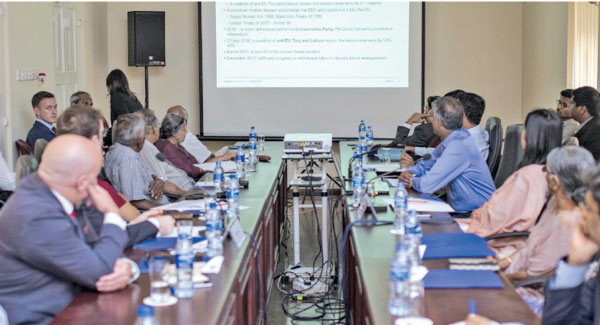The UK’s euroscepticism did not start with Brexit, and has been present in Britain’s domestic policy circles since the creation of the European Economic Community (EEC) in 1957 said Amar Breckenridge, Senior Economist at Frontier Economics (Europe),
He was addressing a Foreign Policy Round Table on “The Progress of Brexit: Implications for Sri Lanka and the Region” at the Lakshman Kadirgamar Institute (LKI).
“It is still too early to accurately predict what the future trading arrangements between the UK, EU, and the rest of the world will look like after Brexit.”
“Sri Lanka needs to move away from its dependence on preferential trading access and towards increasing the competitiveness of the domestic economy,” he added.
The round table was attended by representatives from the British High Commission, US Embassy, Australian Department of Foreign Affairs and Trade, Sri Lanka’s Ministry of Foreign Affairs, as well as representatives from nonprofits and think tanks.
The round table was moderated by Dr. Dinusha Panditaratne, LKI Executive Director, and Adam Collins, Research Fellow of LKI’s Global Economy Programme was a discussant.
Takeaways from Breckenridge’s Presentation
• Giving up full access to the customs union and the single market (a so-called ‘Hard Exit’) could result in annual losses of around GBP 70 billion to the UK economy.
• Estimates from standard economic models of trade suggest that these losses cannot be fully compensated with the signing of free trade agreements (FTAs) with other countries.
• As a result of leaving the single market and customs union, the UK has to bear the financial and administrative burden of implementing new customs regimes previously fulfilled by the EU.
• The need to continue to align these regulations with EU standards could also place additional constraints on the UK’s trade agreements with other countries.
Economic Implications for Sri Lanka
• Forty percent of Sri Lanka’s merchandise exports are to the EU; a disproportionate share of which, is to the UK. These goods currently benefit from preferential tariff rates thanks to the EU’s GSP+ scheme. It remains uncertain whether the UK will continue to offer preferential access to the exports of Sri Lanka and other developing countries.
• If the UK were to standardise its GSP schemes by introducing a single preferential tariff rate for developing countries, Sri Lankan exporters will face an increase in competition from other developing countries vying for the British market.
Implications for the Global Trade System
• Growing worries of greater trade protectionism, particularly by the US, have prompted some European leaders to advocate for a policy shift towards greater liberalisation within the EU, and the employment of protectionist policies targeting imports.
• These could take the form of more aggressive anti-dumping regulations, as well as more stringent labour and environmental standards on imports from outside the EU.
• The EU employing more protectionist policies could potentially impose impediments on Sri Lanka’s trade with the EU in certain manufacturing and service sectors, and threaten to offset the benefits from Sri Lanka’s competitive advantage derived from low-cost labour.
• The UK has historically preferred greater global trade liberalisation. Its absence from the EU is likely to weaken the chances of the EU significantly reducing trade barriers with the rest of the world in the future. This will be crucial at a time when the EU has to re-certify and negotiate its commitments under the WTO.
Key Points from the Round Table Discussion
Looking Beyond Preferential Market Access
• It is important that Sri Lanka looks at what sort of preferential access other countries would receive as a result of future FTAs between the UK and other states.
• It is highly unlikely that Sri Lanka will be approached by the UK to form a bilateral FTA, given the size of Sri Lanka’s economy and the reciprocal nature of FTAs.
• Sri Lanka will, in time, lose its preferential access to the EU market when it moves to an upper middle-income country, and therefore, needs to look at other ways to increase its role in the international trade system.
• Sri Lanka should pay attention to its domestic industrial policy to increase its manufacturing base, and representation in global value chains.



Add new comment